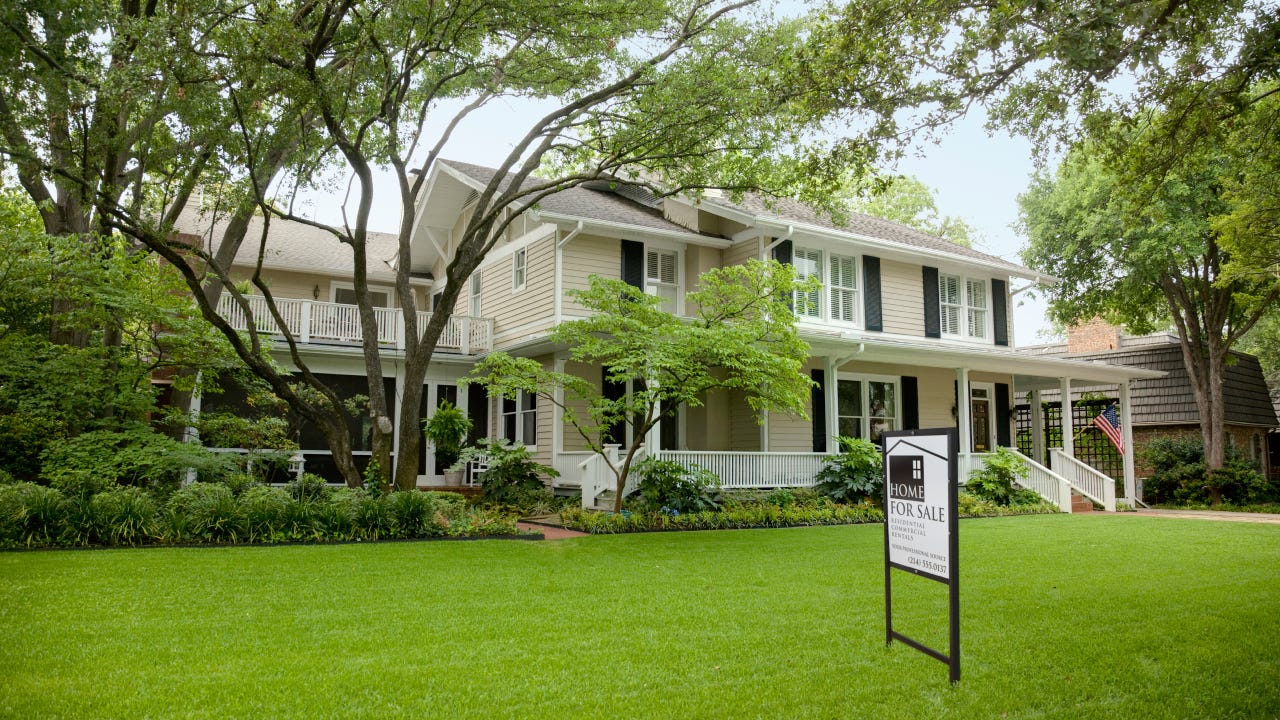Cost to sell a house in Texas

Thinking of selling your home in the Lone Star State? Texas remains a popular destination for many movers who want to enjoy warmer year-round weather, a more affordable cost of living and lower home prices compared to many other areas of the country. Depending on property values in your area, you could stand to make a nice profit on your Texas home.
But it’s important to remember that selling a home isn’t free, in Texas or anywhere. Below, learn more about the expenses that accompany a home sale, including closing costs and more, so you can budget and plan accordingly.
Sellers’ closing costs
As in any state, home sellers in Texas have to be prepared to pay their share of closing costs. This tab can come in higher than many anticipate. “Sellers should budget 8 percent for total closing costs, including about 6 percent for agent commissions and 2 percent for other closing expenses,” says Mason Whitehead, a home loan specialist with Churchill Mortgage in Dallas.
According to data from Texas Realtors and the Texas A&M University Real Estate Research Center, the median price for a home in Texas in July 2023 was $345,000. So, on a median-priced home, 8 percent comes to $27,600 in closing costs.
Here are some of the common closing costs for sellers in Texas:
- Title and escrow costs: Title insurance safeguards against title issues. “The cost of title insurance will depend on the price of the home,” says Todd Luong, a Realtor with RE/MAX DFW Associates in Frisco, Texas. “For a $345,000 home, the title insurance policy will likely cost about $2,123, which is something that is usually paid for by the seller. Meanwhile, title escrow fees are usually around $550.”
- Legal fees: Texas does not require attorneys to close, unlike some states. Instead, Texans typically close with a title company. But that doesn’t mean you shouldn’t consider hiring a real estate attorney to make sure your transaction is buttoned down. “If your sale involves an attorney, it may cost you around $500 to $1,500,” says Andrew Clark, a Realtor with Post Oak Realty in Denton, Texas. Whitehead notes that you may notice on your closing disclosure a document preparation fee on behalf of the lender, which an attorney may charge; these commonly run from $150 to $250.
- Transfer taxes: Texas has no transfer tax for real estate sales, so Texas home sellers get a pass on this common closing cost.
- Property taxes: Texas also has no state property tax. However local governments do collect property taxes, and the rate will vary based on your location. You are required to pay your portion of property taxes for the time you owned your property. “So, for example, if you sold your home on July 15, you would pay your portion of property taxes from January 1 to July 15,” says Luong.
- HOA fees: Prorated homeowner association (HOA) fees, if applicable, are also adjusted based on the closing date. “HOA fees when selling a home in Texas usually range from $300 to $600,” says Luong.
- Seller concessions: Many Texas sellers like to sweeten the deal to encourage a buyer to purchase. It’s also common (but not required) to offer to pay for some of the buyer’s costs, such as the cost of necessary repairs. Buyers may ask sellers to pay for a one-year home warranty, which is usually around $600, Luong says.
Real estate agent commissions
Home sellers usually pay the real estate commission for both their own agent and the buyer’s agent. This is the highest expense the seller will incur, as it runs from 5 to 6 percent of the home’s sale price (that amount is split between the two agents).
“The average real estate commission paid in Texas is 5.59 percent,” says Luong. On a median-priced $345,000 home, that comes to $19,285.50. But the Texas housing market offers a range of prices depending on what city you’re in. In Dallas, where the median is slightly higher at $399,900 according to Redfin data, 5.59 percent would be $22,354; in San Antonio, where it’s lower at $279,990, it would be $15,651.
Home prep and moving costs
Preparing a home for sale and orchestrating a move will add to your costs. Before you list your house for sale, you may choose to invest in minor repairs, staging and professional cleaning to get it looking its best. And then there’s the cost of the move to your new home. “Moving and relocating expenses, which encompass packing materials, hiring movers and transporting belongings, can range from $1,000 to $5,000 or more,” says Clark. “Additional costs include utility transfers, change of address fees and possibly storage fees. Proper budgeting is essential to ensure a smooth transition.”
How much do I get from selling my house?
The net proceeds you can expect to earn from selling your home in Texas can vary widely based on factors like your property’s sale price, how much you initially paid for it, your outstanding mortgage balance (if any), closing costs and any negotiated buyer incentives. The amount of money you pocket at the end of the day will be the home’s sale price, minus all the costs of the sale.
“With Texas being one of the leading states in price appreciation over the past several years, homeowners here have enjoyed bigger gains in their home equity compared to other states,” says Luong. “This has a positive impact on your net sale proceeds.”
Reducing costs
There are several strategies you can pursue to help lower your out-of-pocket selling costs:
- Negotiate the commission: Many real estate agents are open to negotiation on their commission percentage. This is especially true for high-priced homes or if you are using the same agent for a second transaction: If the seller uses an agent to both sell their current home and purchase a new one, says Whitehead, “that agent may give up part of their commission on the buy side as a rebate to you.”
- Shop around for service providers: Do your research on the prices charged by various title companies, real estate attorneys, contractors, stagers and movers. Compare costs and services carefully to score the best deal.
- Sell as-is: When you sell a home as-is, you are essentially telling the buyer that you’re not spending any money on repairs or other forms of sprucing up. This saves you money in upfront prep expenses (but may cost you in the long run, depending on the condition of the home).
- Work closely with your agent: Local agents know their local markets and are trained to get you the most favorable deal possible. “Ultimately, I see sellers net more money if they collaborate with and lean on a knowledgeable agent,” says Clark. “Realtors can guide sellers on cost-effective strategies and professionally market the property, which results in a higher sale price.”
Alternatives
Of course, you don’t necessarily have to take the traditional route to sell your Texas home. Here are some other options to consider:
- FSBO: This acronym stands for “for sale by owner.” Selling your property yourself, without an agent, puts you in charge and lets you avoid paying a listing agent’s commission. However, it’s a lot of work, and you’ll still have to pay your buyer’s agent.
- Sell to an iBuyer or cash homebuyer: Want a quick cash offer with no agent commissions? Big-name iBuyers like Opendoor and Offerpad buy homes in many large Texas markets, including Austin, Dallas–Fort Worth and Houston. And Texas has many cash-homebuying companies on the lookout for properties to flip or use as long-term rentals.
- Rent it out: If you don’t need the cash from a sale right away, consider keeping the home for at least a while longer and leasing it out to a tenant. Steady rental income can be lucrative while you figure out your next move.
- Tap into your equity: Consider leveraging your equity in the form of a home equity loan or line of credit, the proceeds of which can be used to fund a home improvement project that can make your current home work better for you, rather than moving.
Next steps
Ready to sell? Your best first step is to link up with an experienced local real estate agent in your area of Texas. An agent who knows your specific location well can help you both sell for the best price and rein in closing costs to help keep your outlay as low as possible.
“Stay informed about local market trends and seek guidance from experienced real estate professionals,” says Clark. “Try to keep a flexible approach, and be prepared for unexpected shifts in the market.”
FAQs
-
Selling costs differ substantially from one transaction to another, and much is based on your home’s price and your specific location in the Lone Star State. But Mason Whitehead, a home loan specialist with Churchill Mortgage in Dallas, recommends budgeting 8 percent of the home’s sale price for closing costs and real estate commissions. For a median-priced $345,000 Texas home, 8 percent comes to $27,600.
-
No. The state of Texas does not charge transfer taxes on real estate transactions, so this fee, which is common in many states, does not need to be paid by either sellers or buyers.
Why we ask for feedback Your feedback helps us improve our content and services. It takes less than a minute to complete.
Your responses are anonymous and will only be used for improving our website.






